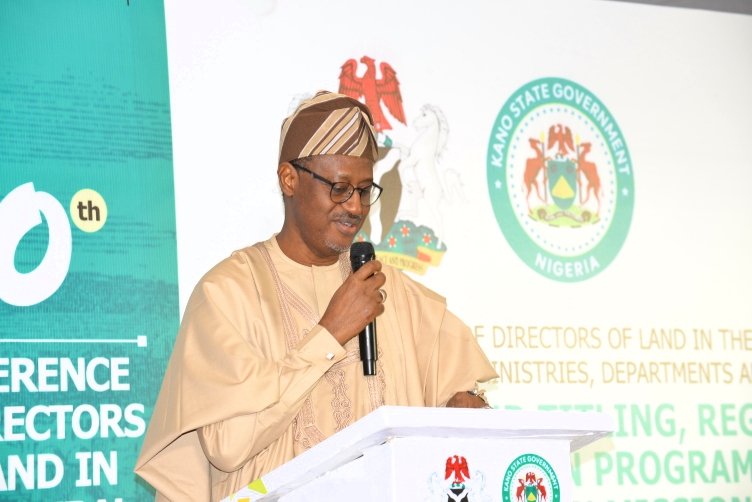Dangiwa Urges States to Dedicate 1–3% of Annual Budgets to Land Titling to Unlock Trillion-Dollar Growth
Nigeria’s Housing Minister Urges States to Allocate 1–3% of Annual Budgets to Land Titling Reforms
The Minister of Housing and Urban Development, Ahmed Dangiwa, has called on State Governments to allocate between one and three percent of their annual budgets to land administration and systematic titling, arguing that credible land governance is central to Nigeria’s ambition of building a $1 trillion economy. He made the statement in Kano at the opening of the thirtieth Conference of Directors of Lands in federal and state institutions.
Dangiwa told delegates that international benchmarks show that land registries and cadastre systems typically operate effectively with about 1% of public expenditure. According to him, Nigeria must align with this standard if it intends to modernise its land records, expand formal property rights and unlock the estimated $300 billion in untitled land currently regarded as “dead capital”.
He stressed that state budgets must prioritise service delivery including systematic titling, digital registries and dispute-resolution mechanisms rather than administrative overheads. He argued that targeted investment in these capabilities would improve market confidence, expand property-backed credit, and boost internally generated revenue.
Land4Growth Positioned as a National Economic Driver
The Minister said the ongoing Nigeria Land Titling, Registration and Documentation Programme (Land4Growth) represents a foundational economic reform under the Renewed Hope Agenda. He added that federal and state collaboration, supported by an emerging partnership with the World Bank, aims to scale nationwide land registration and documentation.
According to Dangiwa, property becomes economically productive only when registries are trusted and when individuals and businesses can confidently use titled land to access credit. He stated that efficient land administration has the potential to catalyse investment, reduce tenure insecurity and stimulate broad-based economic expansion.
Identifying Critical Barriers Across States
Dangiwa pointed to findings from the former World Bank Doing Business report, which ranked Nigeria poorly on property registration due to long timelines, high costs and unclear procedures. He noted that many states face similar challenges, including outdated paper-based systems, inconsistent record-keeping, corruption risks and low revenue mobilisation.
He urged Directors of Lands to use the conference as a platform for harmonisation and reform, emphasising that each state must integrate the national framework into its land governance processes and transition towards digital and transparent systems.
Expectations for States and Land Administrators
The Minister directed land administrators to adopt the national framework circulated by the Ministry and to guide their respective state governments toward standardised implementation. He noted that while progress has been recorded over the past year, sustained reform requires commitment at both federal and state levels.
Earlier, the Permanent Secretary of the Ministry, Dr. Shuaib Belgore, stated that the conference must translate into practical reforms rather than annual discussions. He emphasised that the value of the gathering will be measured by improvements in land governance across the states.
Conclusion
Dangiwa’s call for dedicated budget allocations underscores a broader push to position land administration as a strategic economic priority rather than a routine bureaucratic function. With the Land4Growth programme advancing and federal-state collaboration deepening, stakeholders will now focus on how effectively states can translate policy into measurable improvements in property registration, investor confidence and economic productivity.

